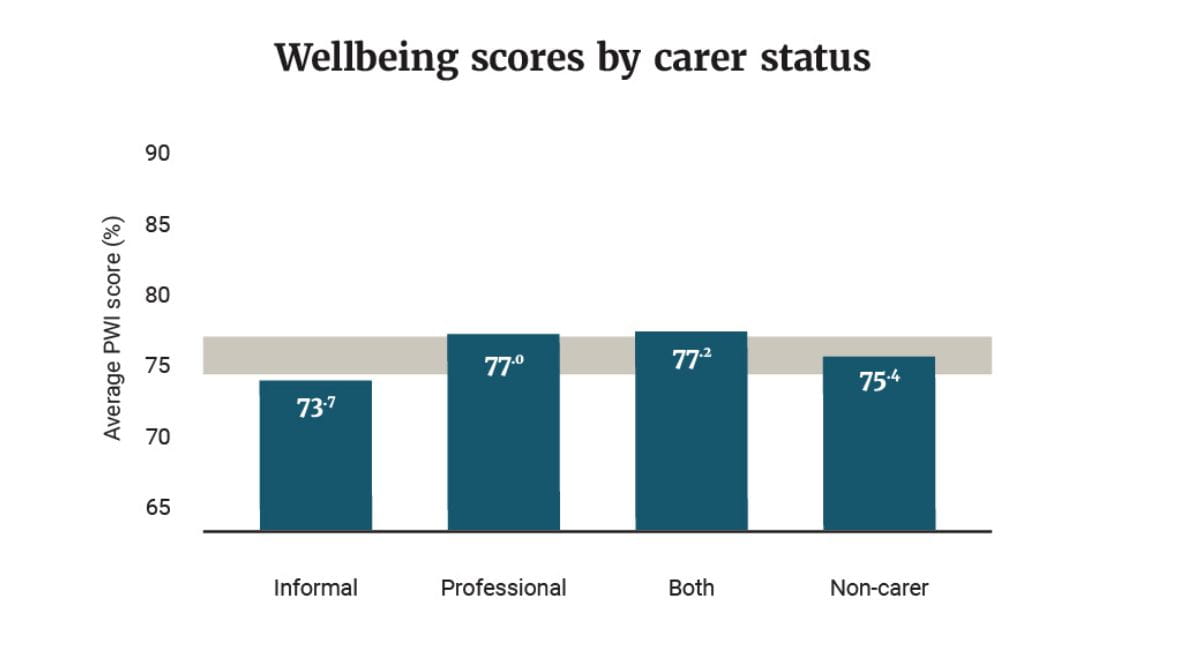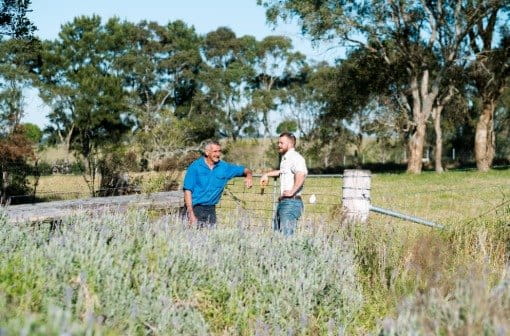“Carers don’t want to be recognised as heroes, but they want to be understood, and they want to be seen.”—Judith Abbott, CEO, Carers Victoria
Key points
- Informal carers play a critical role in our society—and the demand for unpaid caring will only grow as the Australian population ages.
- Australian Unity Wellbeing Index research shows that informal carers with more time intensive caring commitments had lower personal wellbeing, and higher mental distress and loneliness than non-carers.
- Some simple ways to care for an informal carer? Acknowledging the situation they're in, checking in regularly and providing practical support such as help around the house.
“The true measure of any society can be found in how it treats its most vulnerable members.” It’s a quote that’s been variously attributed to both Mahatma Gandhi and former US vice president Hubert Humphrey. Yet whoever actually said it, there’s surely truth to those words, a recognition that how we look after our most powerless groups—whether sick, elderly, disabled or young—is a marker of our broader humanity. Being a carer constitutes a vital social duty, but that’s not to say it’s an easy one.
Take Harry*, a 49-year-old Melburnian who lives with his wife and 12-year-old son while working full-time for a local council. His parents—aged 86 and 92—are separated, but Harry provides informal care to both. He estimates those caring duties amount to about 10 hours a week.
That might not sound like an overwhelming burden, but it still poses a logistical challenge that takes its toll on other areas of his life. Harry can never anticipate when one of his parents will need him, often at short notice, making it impossible for him to plan his time and energy. In a situation where Harry is already juggling work and family commitments, his caring duties bring another curveball into play.
“The most challenging part is the impact it has on my family and myself, because it's impossible for me to be a carer and for it to not impact the people around me,” says Harry.
Harry is not alone. The Australian Government's Intergenerational Report estimates there are 2.65 million Australians (or around one in nine people) who act as an informal carer. And with the number of Australians aged 85 and over expected to triple in the next 40 years. So, that number is woefully inadequate for what lies ahead and there will be a far greater need for people like Harry.
.jpg)
Lower wellbeing and higher mental distress
While hardly unusual, Harry’s experience demonstrates the sort of unspoken demands and issues that informal carers face. “We know that demand for unpaid or informal caring will increase with our aging population,” says Dr Kate Lycett of Deakin University's School of Psychology, the lead researcher for the Australian Unity Wellbeing Index. “So understanding the wellbeing of this group is paramount for us as a society. Anything we can do to improve it is really important.”
The Australian Unity Wellbeing Index is a 25-year study into the wellbeing of Australians, conducted in partnership with Deakin University. This year, the survey had a special focus on the wellbeing of carers—and the results were concerning.
Some 21 percent of respondents identified as unpaid carers, with their roles ranging from helping a neighbour a couple of times a week to providing round-the-clock care to a family member. These informal carers showed a pattern of lower levels of personal wellbeing and higher mental distress and loneliness compared to non-carers and professional carers. This demonstrates the toll that unpaid caring can take.
The impact on everyday life
Such findings are grimly predictable, admits Judith Abbott, CEO of Carers Victoria. “Many unpaid carers are performing their role around the clock, seven days a week. They often leave knowing that circumstances can change quickly, and that they'll need to provide additional support without notice. That can really impact the health and wellbeing of those unpaid carers because of the level of uncertainty they have to live with.
“As the Australian Unity research shows, that can also lead to increased loneliness because it can be quite hard to maintain friendships and social connections if you are having to juggle two full-time jobs [caring and paid employment].”
Unpaid carers also face a greater likelihood of financial hardship. Judith points to new research from Carers Australia that shows carers are 1.4 times more likely to experience financial stress, and almost two-thirds of Victorian carers have experienced at least one significant financial-stress event in the past 12 months. That's up from about half in 2022.
“That includes almost one in five saying they often went without heating or cooling their home in order to save money,” adds Judith. “So we've got this really challenging situation where the cost of living is biting particularly hard for carers. The flow-on in terms of their wellbeing is significant.”

The need for support
One of the biggest factors that determines the wellbeing of an unpaid carer is their overall caring load—that is, how long they spend each week on caring duties. As Harry’s example shows, caring in any capacity poses challenges. But this year's Wellbeing Index found that the bigger the carer’s time commitment, the more likely they were to run into trouble.
“Any unpaid carer who worked more than 20 hours a week had lower personal wellbeing and higher levels of mental distress,” says Kate. “And as that caring load increased to above 40 hours, it was even worse.
“It really shows us that if people are doing that number of hours, we need to give them more help in terms of home care or support. These are good learnings for us going forward as a society when we think about the aging population and just how big the care economy is going to become.”
It's an insight that's underlined by Wellbeing Index findings that show, compared to professional carers, informal carers feel far less satisfied with their access to training and psychological support, and the ability to connect with other carers.
With that in mind, how can the average person support this silent army of informal carers? Judith believes that one step available to everyone is the simple act of acknowledgement combined with the offer of practical support. Many carers are desperately time-poor and stretched to the limit, so helping out around the house or holding the fort when there’s a conflicting appointment can make a big difference.
“Carers don’t want to be recognised as heroes, but they want to be understood, and they want to be seen,” says Judith. “Just taking the time to check in regularly, to see how a carer is going, to recognise what they're doing, to ask how they can be supported—those small actions can be really powerful things.”
*Not his real name.
Disclaimer: Information provided in this article is of a general nature. Australian Unity accepts no responsibility for the accuracy of any of the opinions, advice, representations or information contained in this publication. Readers should rely on their own advice and enquiries in making decisions affecting their own health, wellbeing or interest. Interviewee titles and employer are cited as at the time of interview and may have changed since publication.

.jpg)

.jpeg)